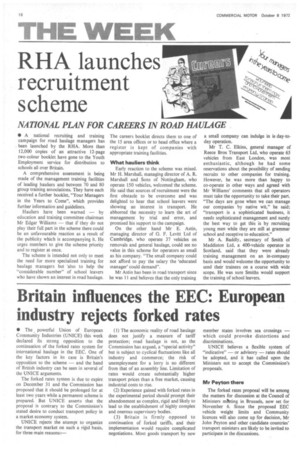THE WEEK RHA launches recruitment scheme
Page 20

If you've noticed an error in this article please click here to report it so we can fix it.
NATIONAL PLAN FOR CAREERS IN ROAD HAULAGE
• A national recruiting and training campaign for road haulage managers has been launched by the RHA. More than 12,000 copies of an attractive 12-page two-colour booklet have gone to the Youth Employment service for distribution to schools all over Britain.
A comprehensive assessment is being made of the management training facilities of leading hauliers and between 70 and 80 group training associations. They have each received a further booklet, "Your Managers in the Years to Come", which provides further information and guidelines.
Hauliers have been warned — by education and training committee chairman Mr Edgar Williams — that if they do not play their full part in the scheme there could be an unfavourable reaction as a result of the publicity which is accompanying it. He urges members to give the scheme priority and to register at once.
The scheme is intended not only to meet the need for more specialized training for haulage managers but 'also to help the "considerable number" of school leavers who have shown an interest in road haulage. The careers booklet directs them to one of the 15 area offices or to head office where a register is kept of companies with appropriate training facilities.
What hauliers think Early reaction to the scheme was mixed. Mr H. Marshall, managing director of A. R. Marshall and Sons of Nottingham, who operate 150 vehicles, welcomed the scheme. He said that sources of recruitment were the first obstacle to be overcome and was delighted to hear that school leavers were showing an interest in transport. He abhorred the necessity to learn the art of management by trial and error, and promised his support to the campaign.
On the other hand Mr E. Astin, managing director of G. F. Levitt Ltd of Cambridge, who operate 37 vehicles on removals and general haulage, could see no value in this scheme for operators as small as his company. "The small company could not afford to pay the salary the 'educated manager' could demand".
Mr Astin has been in road transport since he was 11 and believes that the only training a small company can indulge in is day-today operation.
Mr T. C. Elkins, general manager of Reece Bros Transport Ltd, who operate 65 vehicles from East London, was most enthusiastic, although he had some reservations about the possibility of sending recruits to other companies for training. However, he was more than happy to co-operate in other ways and agreed with Mr Williams' comments that all operators must take the opportunity to take their part. "The days are gone when we can manage our companies by native wit," he said; "transport is a sophisticated business, it needs sophisticated management and surely the best way to get this is by recruiting young men while they are still at grammar school and receptive to education."
Mr A. Baddly, secretary of Smith of Maddiston Ltd, a 400-vehicle operator in Scotland, said that they were already training management on an in-company basis and would welcome the opportunity to send their trainees on a course with wide scope. He was sure Smiths would support the training of school leavers.






































































































